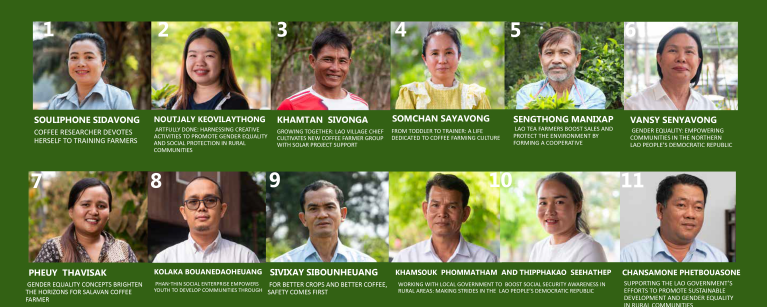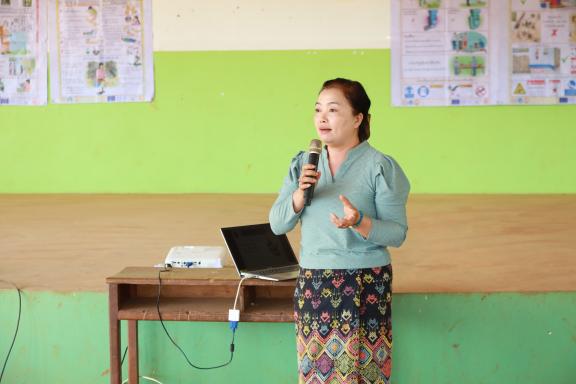
Souliphone Sidavong, Coffee researcher devotes herself to training farmers
As a researcher, farmer and all-around coffee connoisseur, Souliphone Sidavong knows pretty much everything one can know about coffee. “As far as I’m concerned, the best coffee is that which I’ve grown and processed myself,” she said with a fond smile, “because when I drink it, I feel deeply satisfied that I’m able to spend my life working in the coffee business.” Her passion for coffee cultivation and farmer empowerment has led her to teach local farmers about crop care and the importance of membership in the national social security scheme through training sessions supported by the SOLAR Project – a European Union-funded initiative implemented by the ILO and Oxfam.
Embracing her role as a mentor and researcher, Souliphone’s dedication to the coffee industry and community health reflects her unwavering commitment to empowering farmers and fostering a thriving agricultural community in the Lao People’s Democratic Republic. After completing her master’s degree at the Faculty of Agriculture of the National University of Laos, she secured a job at the Agricultural Research Centre of Southern Laos and moved to Paksong District. Today she is the centre’s Deputy Head of Engineering and is involved in the production of coffee seedlings as well as studying better ways to care for coffee crops.
As part of her role at the Agricultural Research Centre, Souliphone teaches farmers about new coffee seedlings and ways to protect their plants against insects and diseases. Through her efforts, farmers are also learning about occupational health and safety and the importance of social security, including the National Health Insurance scheme, which she views as particularly important in a sector like agriculture where accidents can be all too common. They can also be very unexpected, which she illustrated by recalling a recent incident in which a local coffee farmer was bitten on the mouth by a venomous green pit viper, which left her in agony before receiving proper care at the hospital (thankfully, she has fully recovered). “In my opinion, social security, safety and health are very important for farmers,” Souliphone noted. “The most important thing for humans is happiness, and you can never be happy if you’re not healthy. No matter how much you earn or how many possessions you have, it amounts to nothing if you become ill.”
As a result of her training, farmers have developed an increased interest in social security and occupational health and safety, and this year she has 40 training sessions planned. Souliphone conducts her training sessions with support from the ILO through the SOLAR Project. Her training career first began when she enrolled in a training of trainers programme by the ILO in 2019. Her first training sessions began shortly thereafter with two coffee production groups, and in 2021, this work was expanded to also include training for tea farmers in the region. Souliphone says that when she is running her training sessions, she does not feel like she is a trainer, but rather considers herself as a researcher who shares her experiences and challenges with others. She says she always learns from those she is teaching, and she hopes to improve herself further and gain more and more experiences because of her ongoing desire to explore and learn. Indeed, Souliphone’s commitment to coffee farming extends beyond the research centre and the training room to her own one-hectare coffee farm, where she cultivates tens of thousands of coffee plant seedlings that she sells to other farmers.
Even though she has spent her whole life among coffee and tea plantations, she says that she never tires of this environment and hopes to continue in this line of work until her retirement. “I feel happy and relaxed when I walk around coffee plantations and talk to farmers in the morning and evening,” she said And because apparently coffee research, coffee cultivation and training coffee farmers is not enough, she is also contemplating one day running a small café in her local town, where she can meet up with other coffee drinkers and producers and discuss shared interests. It is probably safe to say that it will be the best – or at least most heavily researched – cup of coffee around.
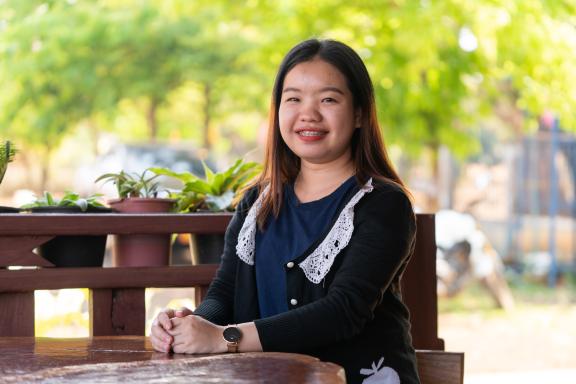
Noutjaly Keovilaythong, Artfully done: Harnessing creative activities to promote gender equality and social protection in rural communities
It can be difficult to change people who are set in their ways, even when you are trying to do so for the best of reasons. It can be particularly challenging if you come from a different background than your audience, who might resist the overtures of an outsider. It is a good thing then that Noutjaly Keovilaythong, who conducts social protection and gender equality training in rural areas of the Lao People’s Democratic Republic, enjoys being forced out of her comfort zone.
At just 26 years of age, Noutjaly already has a wealth of experience championing social development initiatives. Though a Vientiane Capital native, she took strongly to the idea of working to assist rural Lao communities while studying at the National University of Laos after volunteering on community development projects, like those at the Participatory Development Training Centre (PADETC). After graduating in 2021, she got a job with the Phan-Thin Social Enterprise, which trains rural people on community development, media and information literacy, basic finance, and leadership and management skills – and she immediately took to the work. “Working with a non-profit organisation like Phan-Thin is more rewarding than I expected because it gives me all kinds of new experiences”, Noutjaly said. “Now I have a better understanding of how much people in remote areas need our help.”
The Phan-Thin Social Enterprise was recently selected for a grant from Oxfam under the SOLAR Project – a European Union-funded initiative implemented by the ILO and Oxfam – for promoting labour rights, social security, occupational safety and health, and gender equality in Salavan Province. Noutjaly is a technical officer on the project and travels from Vientiane to remote communities in Salavan Province every month to work with local villagers and conduct training sessions. She is also responsible for coordinating with government officials and village authorities in Salavan Province.
Motivating people in rural areas to take an interest in social security, occupational safety and health, and gender equality can be difficult because these are very new and foreign concepts to them. “It can take years, sometimes generations, to internalise these concepts and their advantages, and even longer to incorporate into their daily lives,” Noutjaly noted. In addition, due to longstanding cultural traditions in the Lao People’s Democratic Republic, especially in rural areas, a husband, uncle or another man is usually considered to be the head of a family – a belief that is rooted in social norms about traditional gender roles. It can therefore be doubly hard for a young woman like Noutjaly to engage her audiences and convince them of the benefits, as some older people and men do not like to be trained by a young woman. So, before she goes into the field, Noutjaly learns about the specific circumstances and needs of farmers in that area. She thinks about how best to respond to those needs and tailors her training content so that the farmers will be interested in her views and guidance. While social security is very important for farmers, some struggle to understand the system and few people are interested, at least initially. Noutjaly and her team try to explain the benefits in fun and interesting ways. Sometimes, they encourage the farmers to have singing competitions to make the entire training session entertaining and to work past participants’ inhibitions and barriers. Noutjaly is also persistent. When she goes to a village a second or third time, the locals usually show more interest and ask more questions.
Thanks to her and her team’s efforts, almost 200 people in Salavan Province have registered in the social security scheme so far. The patriarchal outlook in many rural communities means that Noutjaly generally finds that people are not interested in openly discussing gender equality. Undaunted, she instead uses a different approach called the Gender Action Learning System, or GALS. GALS does not aim to explain or promote concepts of gender equality, but rather engages participants in simple drawing activities. These activities prompt the participants to think about and ask questions about family situations, like who does what work on the farm and in the house every day – and how much work they do. The drawings and questions also prompt people to identify what they want in life, and to think of ways to achieve these goals.
As a result of the GALS training under the SOLAR Project, many farmer production group leaders and group members – both men and women – now share both farming and household work more equally. Noutjaly can generally be found with a smile on her face and a joke at the ready, making it easy to see how she can communicate with just about anyone on even the most difficult of topics. But even with her positive, can-do attitude she remains concerned about the current situation in the Lao People’s Democratic Republic because more and more young people are leaving the country in search of higher paying jobs abroad. “I fervently hope that young people will have greater faith in our home country,” she said, “and want to improve things by using their energies to spur development here.”
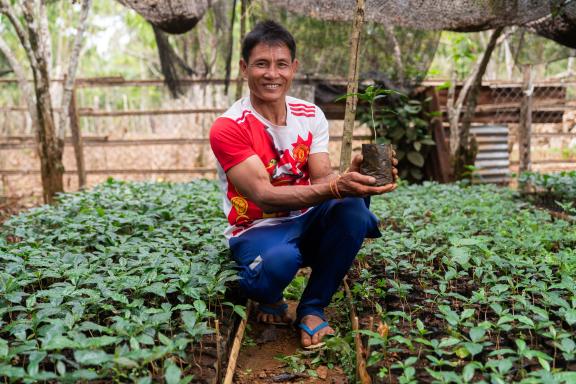
Khamtan Sivonga, Growing together: Lao village chief cultivates new coffee farmer group with SOLAR Project support
Coffee growing on the Bolaven Plateau in the Lao province of Salavan is typically a longstanding family affair, with generation after generation working the volcanic soil to produce unique and prized coffee beans. This being the case, coffee farmer Khamtan Sivonga might be considered a bit of an oddity, as he did not grow up among the sights and smells of coffee plantations. Instead the pursuit found him as a young man when he moved from his home province of Champasak to Salavan’s Lao Nga village in search of work. Once there he found more than a job, he fell in love with coffee farming, with his new home, and with a local girl who became his wife. Together they began farming their own coffee crop on a small one-hectare farm. Although he had no experience, he picked up the necessary skills from other growers and friends.
Two-and-half decades later, a 46-year-old Khamtan has three daughters and a 15-hectare coffee farm, and he has been made the Chief of Lao Nga village. Lao Nga have been recognized for their potential by the Lao Government, as well as by international organizations, which are making concerted efforts to support growers, through training on occupational safety and health, social security, and collective bargaining with buyers. One of the most prominent initiatives in this space is the SOLAR Project, a European Union-funded initiative implemented by the ILO and Oxfam.
With SOLAR Project support, 36 families in Lao Nga village recently came together to form the Santiphab Coffee Production Group in order to strengthen the bonds between them and to enable them to bargain collectively with buyers without the need for a middleman. When it came to selecting the leader of the Group, the choice was obvious: Khamtan.
Unlike most of his contemporaries in the village, Khamtan completed secondary school. And as a farmer he found that he had some talent for trading, so he bought coffee beans from other villagers and sold them to companies in Champasak. Khamtan is now using his skills and know-how to help his fellow farmers increase their incomes and improve their livelihoods, and he anticipates that more coffee farming families will join the group as they witness the members’ collective success.
As part of the SOLAR Project, the Santiphab Coffee Production Group members and other villagers are being provided with information about social security, occupational safety and health, and gender equality. As a result, some of the villagers have registered in the government-run social security scheme after attending training sessions, including seven families in the Santiphab Coffee Group. “By subscribing to the social security scheme, we are not losing or gaining money, but getting coverage for hospital treatment,” Khamtan said. He noted that participants in the scheme will get free hospital treatment for basic illnesses. They will also eventually get back the money they contribute to the scheme in the form of a retirement allowance, provided they keep contributing for long enough. He noted that membership gives him peace of mind about healthcare and the payment of hospital bills. In addition, many families and villagers are learning about gender equality and its benefits. Khamtan said that today a growing number of husbands and wives in the community are sharing their workloads more evenly.
As the head of the Santiphab Coffee Production Group, Khamtan welcomes the initiatives of the SOLAR Project, and works to motivate members to be open to new ideas about coffee farming and trading. Speaking of his fellow group members, he said, “They have a lot to learn and have to keep innovating if they are to achieve more success in the future.” With the leadership of individuals like Khamtan and the unstinting support of the SOLAR Project and other initiatives in the region, that success looks very attainable.
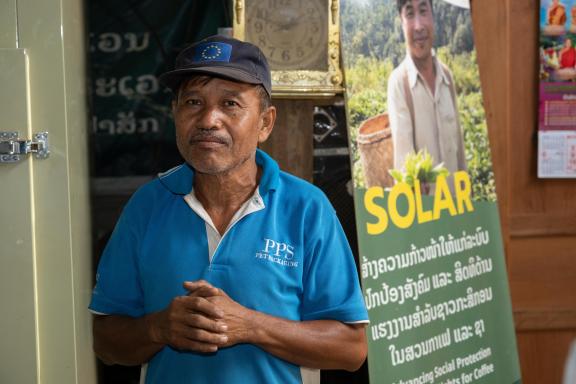
Sengthong Manixap, Lao tea farmers boost sales and protect the environment by forming a cooperative
Cultivated in the cool, hospitable climate of the Bolaven Plateau, Paksong tea is renowned for its unique aroma and taste. It is little surprise then that the tea industry has a rich history in this region of the Lao People’s Democratic Republic dating back more than a century, when Paksong tea started gaining recognition alongside the region’s already famous coffee. However, despite this legacy of excellence, tea farmers in and around the town of Paksong have never had it easy. Traditionally, most households have operated as informal businesses with limited market access, working long hours under difficult conditions and generally without access to social protection. But things have started to change.
In 2020, a group of Paksong farmers, with help from international organizations, established the Paksong Tea Promotion Association to support more than 100 families involved in tea cultivation in Paksong District. And in 2023, the Government took steps to reduce imports of non-essential products, particularly coffee and tea, which should give Paksong tea farmers improved access to local markets and allow them to sell their tea at a better price. Now thanks to support from the SOLAR Project – a European Union funded initiative implemented by the ILO and Oxfam – the Paksong tea farmer’s association has evolved a step further through its recent transition into a cooperative.
Formed in November 2023, the Paksong Tea Cooperative brings together 87 families in seven villages to focus on producing high quality organic teas that meet local and international market demand. This is achieved by cooperative members all adhering to the Lao Department of Agriculture’s 25 standard farming practices, which cover everything from soil preparation all the way through to harvesting, and by prioritizing organic farming practices that ensure an excellent product while also protecting the local environment. Sengthong Manixap, Head of the Paksong Tea Cooperative, underscored the importance of organic production methods and environmental sustainability, but also noted that there is much more to making a great tea than maintaining a plantation of healthy and robust tea plants. “Processing good quality tea involves several key steps to ensure the flavour, aroma and overall quality of the tea leaves are preserved,” he noted as he strolled through the small work area at the rear of his farm. “Some of the key points of making good quality tea include harvesting, withering, rolling, oxidation, drying, firing, sorting, and also packaging.”
With so many steps involved in creating the black, red, white and green teas produced by the cooperative, members undergo extensive training on tea processing techniques across the entire production pipeline. All new members undergo a 20-month evaluation period to ensure their products meet the cooperative’s standards before becoming certified organic producers.
By coming together as a collective – and previously as an association – the tea farmers of Paksong have been able to create a united effort to market and promote their teas, and thereby overcome previous awareness challenges to drive ever growing sales.
“Some years ago, almost no Lao people drank Lao tea,” Sengthong recalled, “but today many restaurants and hotels in the country buy tea from us, and I believe that in the future we may not be able to produce enough, especially in the dry season, because the number of orders is steadily increasing.”
With annual production exceeding 20 tonnes, the cooperative sells its tea at competitive prices in both local and international markets. Now they are looking to capitalize on this success by seeking additional funding to enhance production capacity and quality through technology upgrades, better processing equipment, and greenhouse facilities for the rainy season. Already through support from the ILO, the cooperative has received essential equipment such as solar-powered lights, drying racks, tea leaf rolling machines and protective gear. This support has not only boosted productivity, but has also helped to ensure the safety and well-being of farmers during their work. “Security and safety are very important for farmers because a family usually has only two workers. If there is an accident, it means they lose some of their income,” Sengthong recounted. He added that in the past, many farmers did not pay enough attention to safety or wear any gear to protect themselves, so injuries were commonplace. Now, under the SOLAR Project, almost every month the farmers participate in a training session on occupational safety and health, as well as related areas like social security, gender equality, disability and social inclusion. With things looking increasingly positive for the cooperative, Sengthong is now starting to look beyond the immediate needs of members to the more distant future of the Paksong tea industry. “I believe that the best investment is to invest in young people,” he said. “I hope that if local young people become more interested in this business, then Lao tea and coffee will become famous worldwide.”
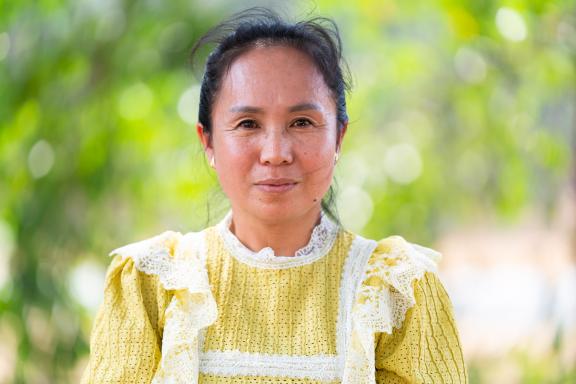
Somchan Sayavong From toddler to trainer: A life dedicated to coffee farming culture
As a child, Somchan Sayavong would play among the coffee trees on the family farm, occasionally helping out, but probably just as often getting in her parents’ way. Those years of youthful play and work amid the green leaves and ripening berries of their small plantation would end up shaping her ambitions as an adult.
“I was lucky to be born in a family of agricultural workers,” said Somchan, now a Coordinator at the Bolaven Plateau Coffee Producers Cooperative (CPC). “This environment has provided me with a lot of knowledge, and I’ve learned more than in any class I’ve attended.” And Somchan would know, as she is a university educated agriculture expert who now leads coordinated training sessions for coffee farmers in the southern region of the Lao People’s Democratic Republic.
Founded in 2007, the CPC is a 100 per cent farmer owned and operated organization made up of nearly 2,000 coffee growing households across 55 villages. The CPC currently receives extensive support from the SOLAR Project – a European Union-funded initiative implemented by the ILO and Oxfam. As she walks through the CPC’s processing factory, Somchan makes it clear that she loves her job and is pleased that she can follow in her parents’ footsteps. She takes pride in the CPC’s success in making coffee products of better quality and earning more money for its members – and for coffee’s role in raising the profile of the Lao People’s Democratic Republic around the world. But the CPC is about more than increasing coffee production and growing sales, and Somchan is particularly committed to the collective’s other mission: promoting the health, safety and social protection coverage of coffee farming households. In her training sessions, farmers and processing workers are taught about occupational health and safety, the Lao social security system, and how to engage in collective bargaining with buyers. New CPC members receive training on safety and how to use the safety materials provided, as well as the need to wear safety clothing and gear.
Somchan’s dedication to promoting the safety and health of farmers and coffee workers and ensuring that they are covered by social protection reflects her belief that happiness stems from good health. This mission inspires her to continue empowering farmers and exploring new ventures in the coffee industry, which are being supported by SOLAR Project, including the provision of safety materials used in coffee processing plants and on farms.
“The safety measures that we have learnt are very relevant to our work. They help to reduce production costs and we feel safe while working, both in the factory and on the farm. We also have better quality products,” she explains. But efforts to persuade CPC members to subscribe to the Lao social security system have not met with universal success, as some members believe the health care benefits do not live up to their promise. A particular issue is that the social security card can only be used at one hospital in the locality, which limits access and the extent of care available. However, Somchan is hopeful that over time, it will become more and more appealing to coffee farming households.
“All the staff at CPC have social security because we have to. I believe that most of our members have enough money to become independent members. Everyone will do so if the Government can resolve the problems that some people have experienced,” she said.
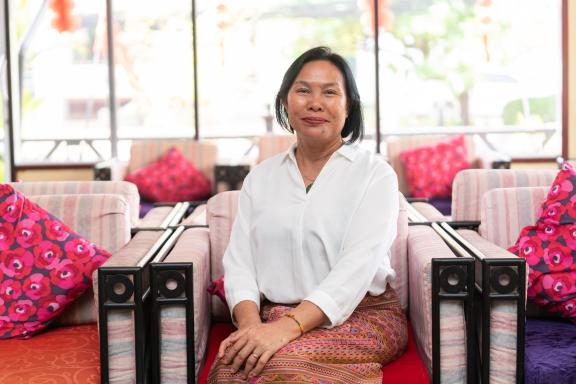
Vansy Senyavong Gender equality: Empowering communities in the northern Lao People’s Democratic Republic
Gender equality is not just a fundamental human right, but a crucial element for achieving a harmonious society where individuals can reach their full potential and where sustainable development can thrive. In many developing countries, including the Lao People’s Democratic Republic, entrenched cultural traditions and norms have posed challenges to promoting gender equality. However, recent efforts by various non governmental and international organizations are making strides in advancing this cause even in the country’s most remote regions.
In the northern province of Bokeo, a grassroots organization known as Maeying Huamjai Phattana (MHP, or Women Mobilizing for Development) is working tirelessly to uplift rural communities by enhancing livelihoods, ensuring access to healthcare and social security, and promoting gender equality. Vansy Senyavong, the Chief Director of MHP, emphasizes the importance of empowering women and youth through education and sustainable income generation from agriculture and forest resources.
Through support from the SOLAR Project, a European Union-funded initiative implemented by the ILO and Oxfam, MHP is facilitating training sessions for villagers on gender equality, disability rights, and social inclusion. These initiatives have not only enhanced understanding but have also fostered a sense of shared responsibility among community members towards protecting their environment and promoting gender equality.
Ms Vansy explained that the idea to create MHP came to her at a party celebrating the ending of an international NGO project in Bokeo Province. At the party, most of the men were having a meal and drink with the guests, while the women were working in the kitchen in the back of the house and allowed only the young girls to join the party. She noticed some women and the kids eating on the f loor and when they came closer to the party area they were harassed by the men. Ms Vansy felt this was unfair and immediately decided to do something to promote gender equality. Ms Vansy established MHP in 2010 and has since conducted more than 30 projects, including seven recent projects focusing on improving the quality of lives in rural areas. Despite the deeply rooted patriarchal norms in the country, efforts to shift mindsets towards gender equality are gradually gaining momentum. Ms Vansy acknowledges the challenges of introducing this concept, particularly among ethnic groups in remote areas, like the Hmong and Khmu.
To overcome resistance, MHP employs innovative approaches like the Gender Action Learning System (GALS), which engages participants in activities that prompt critical thinking about family dynamics, poverty alleviation and gender roles. GALS does not aim to overtly explain or promote concepts of gender equality, but rather empowers participants through simple drawing activities. Through GALS activities, which also involve separate group discussions for men and women, participants reflect on their roles and responsibilities in family and work situations, as well as their hopes and aspirations. This approach has led to transformative changes, with men acknowledging societal pressures to always appear strong and women expressing desires for greater decision-making power within their families. According to Ms Vansy, three key improvements have been observed after these training sessions. First, a number of men in remote target villages have changed their mindsets and behaviours. Previously, they would assign all the household responsibilities to women, resulting in women working excessive hours without sufficient time to relax, while men had ample time to socialize and indulge in leisure activities. Second, the number of women attending meetings, seminars and workshops has increased, allowing them to share their ideas about problem-solving.
“Lastly, the staff in our team have enhanced their gender-related skills, both in their work and personal lives,” Ms Vansy said, demonstrating that even the trainers are directly benefiting from the sessions with villagers. By fostering dialogue and introspection on gender norms and equality, initiatives like those of MHP are paving the way for inclusive development and empowerment in the Lao People’s Democratic Republic. As communities continue to engage in these conversations and activities, the seeds of change towards a more equitable society are being sown, one drawing at a time.
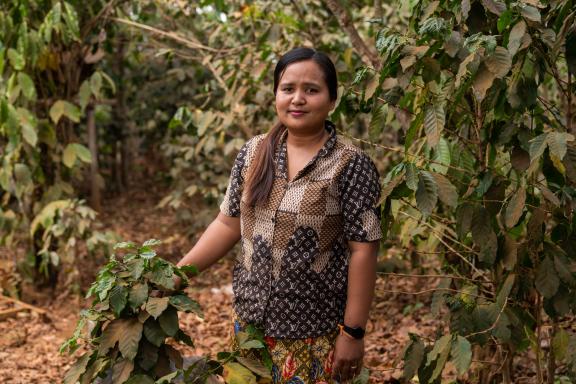
Pheuy Thavisak Gender equality concepts brighten the horizons for Salavan coffee farmer
It is not particularly easy to reach Lao Nga village. Perched upon the Bolaven Plateau in the southern reaches of the Lao People’s Democratic Republic, the village is just 30 kilometres from the district capital, but it is hard going to traverse the bumpy dirt roads, particularly when they swell with mud in the rainy season. But if you are willing to make the journey you will be greeted by a lush green paradise for coffee lovers, with plantations stretching in all directions and the aroma of coffee wafting up from villagers’ kitchens as they roast coffee beans using traditional equipment. If you’re lucky, someone might be kind enough to make you a perfect cup, but don’t expect to find a café waiting for you – at least not right now.
Pretty much everyone in Lao Nga is engaged in coffee farming, and given this singular pursuit and its remote location, it is probably no surprise that tradition has generally ruled all aspects of village life – be it on the plantation or in the home. But as local coffee farmer Pheuy Thavisak can tell you, things are starting to change. Born into a coffee farming family, Pheuy attended primary school as a child but did not finish. Her parents felt it was not advantageous for girls to get an education. Their belief was that after getting married, girls need to stay at home, take care of their children and do the housework. Such attitudes are commonplace in the Lao People’s Democratic Republic, which traditionally has been a patriarchal society where men are expected to be the primary breadwinners and decision-makers in a family. Women have to work on the farm with their husbands and also do all the housework themselves. Such traditions not only overburden women, but also discriminate against single mothers and women-headed households.
Now 33 years old, Pheuy puts forward a strong sense of purpose and is clearly a devoted mother to her two children, aged 11 and 13. The impression you get while speaking with her is not of someone who did not complete primary school. She is bright and engaging, and talks confidently about herself and her family’s plans. So far, both of her children have received more schooling than she had the opportunity to benefit security, occupational safety and from, and it is her particular hope that they will be able to attend university.
“Life as a farmer is not too bad, but it would be much better if we were better educated about coffee cultivation techniques,” she said. “There is a very good market for coffee in Laos and in other countries. I feel that we could earn more than we do now.”
Last year, Pheuy and her husband took a step towards this ideal by joining the Santiphab Coffee Production Group, an organization of 36 coffee-growing families in Lao Nga that came together through the support of the SOLAR Project, a European Union-funded initiative i mplemented by the ILO and Oxfam. Through the Group, members will be able to work together to improve coffee production and bargain collectively with buyers to secure better prices without having to rely on middlemen. “Membership in the group is very helpful. It enables me to improve my coffee products and marketing techniques. Generally, it is good for my family and myself,” she says. And through the SOLAR Project, group members are receiving training on social security, occupational safety and health, and – importantly – gender equality.
The concept of gender equality is new to the villagers of Lao Nga, but the trainings are slowly helping to change longstanding cultural traditions. As we toured her coffee farm, Pheuy noted that she and her husband recently attended a workshop on gender equality organized by the SOLAR Project. The session was eye-opening for them both: “Since then, my husband has spent less time drinking with his friends and helps me with the housework”, she said with a laugh. Pheuy believes that Lao Nga village is transforming into a good example for promotion of gender equality, as new ideas are taking hold and Group members are increasingly opening up to them.
As an example of her growing confidence, Pheuy has convinced her family to open a small shop selling basic household supplies. This helps to supplement their incomes from selling coffee cherries and to meet their high expenses. But she brightens up and laughs when she reveals her true dream of opening a café where locals and visitors can savour the exquisite taste of freshly brewed coffee made from beans that she has harvested on her own land. So perhaps Lao Nga village will be getting that café after all.
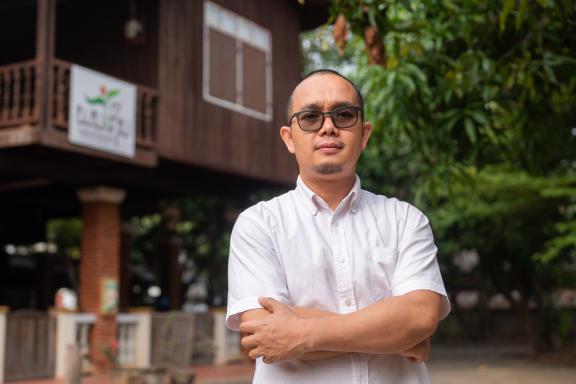
Kolaka Bouanedaoheuang Phan-Thin Social Enterprise empowers youth to develop communities through soft skills training
In the heart of the Lao People’s Democratic Republic, the Phan Thin Social Enterprise (PTSE) is making waves by empowering young people and communities through comprehensive soft skills training. Founded in 2018 by a group of ambitious youth, the non profit organization aims to equip individuals with the necessary tools to become leaders in their communities, thereby fostering growth and development.
The name “Phan-Thin” holds a special meaning in Lao culture. “Phan” symbolizes a seedling, while “thin” represents regions and communities. Together, they signify PTSE’s mission to nurture and cultivate the potential within each individual and community. According to Kolaka Bouanedaoheuang, Director of PTSE, by recognizing the unique perspectives and innovative ideas that young people bring, the organization focuses its efforts on empowering youth to drive change within their communities. By providing training in areas such as leadership, community development, media and information literacy, finance, and organizational development, PTSE is working to create a new generation of community developers.
PTSE’s initiatives span across four provinces in the Lao People’s Democratic Republic, and the organization tailors their training programmes to the specific needs of each region and covers topics as diverse as farm and non-farm production processes, collective bargaining, essential work skills, social security, and equality of gender and labour rights. For instance, in Xieng Khuang and Salavan provinces, PTSE provides training on cultivation and husbandry techniques for farmers. In Bolikhamxay, the focus is on developing handicraft skills; while in Vientiane Capital, activities that centre around environmental protection are prioritized.
One of the key strategies employed by PTSE is to help farmers form groups and democratically elect their leaders. This approach fosters a sense of ownership and responsibility among the participants. Funding for these initiatives comes from partnerships with international organizations and international NGOs such as Oxfam and with initiatives like the SOLAR Project, which is funded by the European Union and implemented by the ILO and Oxfam. Kolaka said that he and his team have witnessed firsthand how young people are quick to develop products and access market opportunities. One inspiring example he noted is the Nam Beng village group, which consists primarily of youth members. This group successfully opened a coffee shop in the main town in Lao Ngam district and even won the prestigious Best Lao Coffee award for 2022–23.
Engaging farmers in remote areas can be challenging due to their adherence to traditional practices that have been practised for centuries. But PTSE believes in the power of participation by a range of stakeholders, including Lao Women’s Union members, labour organizations, social welfare agencies, agricultural departments, village communities and farmers themselves. By involving everyone in the planning, design and evaluation process, PTSE fosters understanding and interest among farmers. Kolaka acknowledges the difficulties involved in capturing the interest of young people, but emphasizes the importance of doing so. He explains that by helping them recognize the value of the resources at their disposal and by encouraging the production of high-quality products like coffee and tea, their incomes can improve significantly.
The Nam Beng village group is a shining example of how PTSE’s efforts can have positive flow on effects that go beyond the initial participants. Starting with just a few members, their success attracted more participants and inspired other groups to follow. Their journey showcases the transformative power of PTSE’s soft skills training in enabling individuals to create positive change within their communities.
Through their dedication and commitment to nurturing young leaders and providing essential skills training, PTSE is sowing the seeds of progress and development throughout the region.
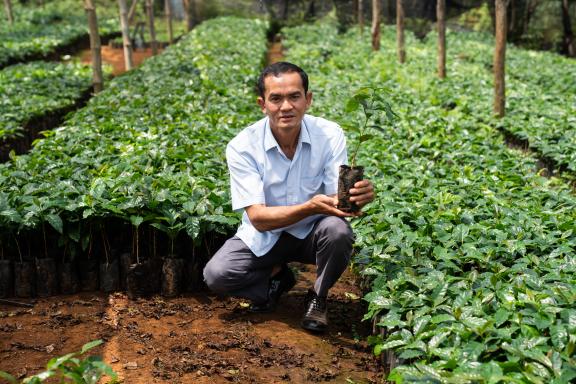
Sivixay Sibounheuang For better crops and better coffee, safety comes first
Nestled atop a plateau 1,200 metres above sea level, the air in this remote corner of the Lao People’s Democratic Republic carries the refreshing aroma of coffee, promising a comforting haven for visitors seeking respite from a crowded and busy urban life. This means the Bolaven Plateau is a big tourist attraction, especially at the beginning and end of the year when it is time to harvest the coffee crop. Visitors are able to immerse themselves in the natural world and learn about coffee farming and processing involving both traditional and new techniques. But while these visitors are prized as a source of revenue and product promotion for local farmers, there are others that are much less welcome. Invasions of pests and plant diseases bring big challenges for farmers as they work to tend to their crops, and they need to not only deal with these unwanted visitors but do so safely.
Fortunately, Sivixay Sibounheuang, a trainer at the Agriculture Research Centre of Southern Laos (ARC), is ready to help them. Sivixay is confident that the use of proper agricultural techniques will enable farmers to raise healthier crops and reduce the chance of injury, and thereby help reduce farmers’ poverty by providing them a better income. But disseminating good agricultural practices among thousands of farmers is a big task. Recognizing both the scale and importance of this undertaking, Sivixay started reaching out to several organizations in order to get their help in delivering training to farmers on how to produce better quality products that have a greater sale value, as well as learning about the importance of safety.
Last year Sivixay took things a step further with the help of the SOLAR Project – a European Union-financed initiative implemented by the ILO and Oxfam – by setting up the ARC’s new Worker Information Centre to provide farmers with information on occupational safety and health. The Centre informs farmers about the importance of safety and how they can protect themselves, and has already assisted more than 1,000 farmer participants. In addition to delivering training sessions and consultations, the Centre distributes practical information by screening videos and distributing posters, flyers and other materials to farming households.
The Worker Information Centre offers dedicated training for farmers on pest/insect control, including through the use of pesticides and natural methods, as well as training on long-term health and skin care issues related to exposure to chemicals. Through the SOLAR Project these trainings have been strengthened through the introduction of occupational safety and health training sessions, which better enable farmers to care for both their crops and themselves.
Sivixay said farmers have traditionally tended to pay more attention to the care and safety of their crops than they do to their own well-being. Many farmers do not wear protective clothing or use any equipment meant to keep them safe as they work. Some people have been bitten by animals – including venomous snakes – or cut themselves when using sharp knives. “The training we provide helps them to understand what they can and cannot do to protect themselves and also what they should do if they have an accident or are bitten by a harmful animal,” he added. Following training sessions, staff at the Worker Information Centre observe farmers in the field to check that they are putting the advice into practice. Sivixay noted, however, that it can be difficult to persuade farmers of the importance of safety because it is a new concept for them and much of their farming practices are steeped in tradition. But farmers are facing an increasing number of health risks due to more frequent use of farming machinery and chemicals, making safety a more pressing priority than ever before.
“We are also trying to get them to subscribe to the social security system, as it covers hospital treatment, but of course they have to have enough money to be a member of the scheme,” he added. Sivixay hopes that in the future the Worker Information Centre will become an even larger learning centre where farmers and students can obtain a wealth of important information to help them with their work and lives. ”I am thankful to the SOLAR Project for supporting this important issue for our Lao farmers. So many farmers have come to the Worker Information Centre to ask me questions. I am confident that the Centre will continue to grow and make a difference in future.”
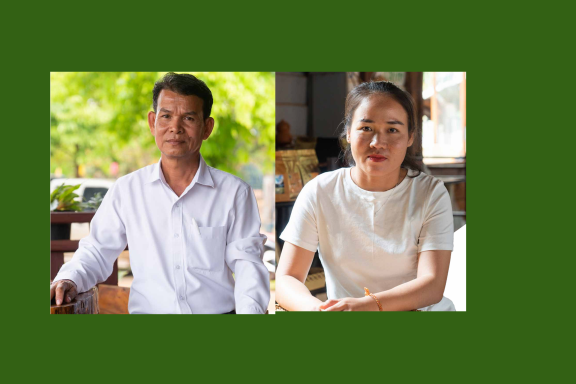
Khamsouk Phommatham and Thipphakao Seehathep 73 Working with local government to boost social security awareness in rural areas: Making strides in the Lao People’s Democratic Republic that membership can confer.
In the Lao People’s Democratic Republic, social security membership can grant you access to free healthcare and provide you with a pension in old age. That may sound like a good deal, but it can still be a challenge to get people enrolled, particularly in rural areas. In the Lao province of Salavan, social security membership is a relatively new concept – new enough that many farming communities don’t really know much, if anything, about it. In addition, incomes tend to be low in the rural areas of the province, which can make people anxious about the idea of handing over a portion of their already meagre earnings, even with the benefits. So how do you convince people to join a scheme that they don’t understand or fear they cannot afford? And how do you combat misinformation about social security? These are challenges that have faced the Salavan Province Social Security Office for years.
Sitting recently at a popular café in the town of Laongam, Khamsouk Phommatham, the head of the Provincial Social Security Office, spoke of the benefits of the social security scheme, as well as the challenges that his Office faces in promoting it.
“Today, anyone can join the social security scheme,” he said. “Membership in the scheme can make people’s lives easier and less problematic. In most rural areas, people do not want to go to a hospital because of the costs. But social security covers these costs.” Even so, the majority of the villagers have not registered in the social security scheme, he said, as most do not understand how the system works or how it can benefit them.
“Some people are [also] given system offers them security and wrong information about the scheme and hear from their friends that the services provided are not good,” he noted. “Stories about discriminatory treatment in hospitals are common, such as reports that you’ll only be given paracetamol if you need medication.”
Recognizing the difficulties faced by the authorities, the SOLAR Project – a European Union-funded initiative implemented by the ILO and Oxfam – recently funded a pilot in the southern provinces of the Lao People’s Democratic Republic to help local authorities to publicize the benefits of the social security scheme and to bring the services closer to farmers.
Thipphakao Seehathep, a Technical Officer at the Salavan Provincial Social Security Office, spoke of the success that the pilot programme has had so far. “To begin with, villagers were afraid of us because they thought we would take their money and cheat them somehow, but SOLAR Project staff organized a workshop to encourage people to subscribe to the scheme. They explained how the social security system offers them security and how they can sign up using a mobile registration service in the village, which made it easy for people to access the system.
“Now we know how to communicate with villagers more effectively. A lot more people signed up when we provided them with registration facilities and this year we have 118 members in ten villages,” she said. SOLAR Project staff think that this year more people will subscribe, because villagers now have a better understanding of what is involved and talk to their friends and neighbours about what actually happens when they visit a hospital and use their membership card But the pilot is ultimately less about directly getting rural people enrolled in social security and more about giving Social Security Office staff the tools they need to continue reaching out to the communities they serve over the long term.
For Thipphakao, her experience with the pilot has been transformative. “Communication training supported by SOLAR is very helpful for our work, especially for me, as I did not have any experience of communicating with authorities, companies and villagers in ways that ensure they listen and understand what we are trying to do for them,” she said.
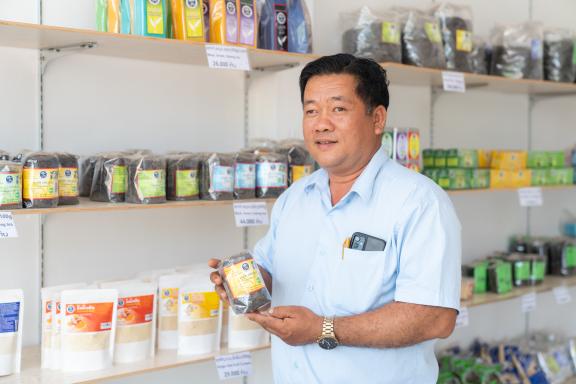
Chansamone Phetbouasone Supporting the Lao Government’s efforts to promote sustainable development and gender equality in rural communities
Blessed with lush landscapes and Stories from the SOLAR Project 83 rich natural resources, the Lao People’s Democratic Republic is a country brimming with potential. However, despite the abundance of resources, many people in rural areas lack the knowledge and tools needed to harness these assets for their own benefit. Now, in a bid to combat poverty and pave the way for sustainable development, efforts are being made to equip rural communities with the skills they need to thrive. One key initiative driving this change is the Association to Support the Development of Peasant Societies (ASDSP), established in 2008.
According to Chansamone Phetbouasone, a Technical Officer at ASDSP, the association is dedicated to supporting Lao farmers in integrating sustainable practices into their work. By emphasizing the importance of environmental conservation, social responsibility and traditional values, the ASDSP aims to uplift rural communities and pave the way for a brighter future. To this end, the ASDSP provides technical support to villagers on organic agriculture, value chains and access to markets in Vientiane, and export through fair trade certification. Their products are labelled under the Lao Farmer Products enterprise. With the support of the SOLAR Project, a European Union-funded initiative implemented by the ILO and Oxfam, the ASDSP has expanded the scope of its activities to offer training sessions on negotiation skills, social security schemes, gender equality, and health and safety. In addition, with SOLAR Project support the ASDSP has started working closely with l ocal government partners to form farming production groups in Paksong and Thateng districts and to empower women leadership in these groups (by encouraging nomination of women in administrative and financial roles). By equipping farmers with the necessary knowledge and tools, the ASDSP aims to enhance productivity, improve livelihoods, enhance gender equality and foster a sense of security among rural communities.
But despite these efforts, challenges persist. Weather extremes and crop diseases continue to pose threats to farmers’ livelihoods, while fluctuating market prices add further complexity to the agricultural sector. The rising costs of labour and agricultural inputs further compound these challenges, making it difficult for farmers to sustain their operations. Moreover, concerns around a lack of social security coverage and access to quality healthcare persist among rural communities; though there is a growing interest in social protection schemes. Chansamone said positive changes are also taking place with regard to gender equality, but admitted that given the patriarchal nature of traditional Lao society, this concept can be difficult to get across and it will take time to convince communities around the country of the need for changes in their behaviours, family structures and distribution of labour. But after talks held between villagers and the ASDSP and other initiatives that are trying to drive change and alter ingrained perceptions, people are beginning to change their attitudes, and slowly but surely, women are f inding their voice.
Today, women can be seen taking a more active role in decision-making and in leading the direction of discussions at meetings, so that they have a greater say in community affairs. In addition, there are hopeful signs of greater equality among families, with men taking on more responsibility in household activities and showing more support for their wives and other womenfolk.
As the Lao People’s Democratic Republic navigates the numerous challenges it faces and strives for sustainable development, it is clear that empowering rural communities is essential, so that everyone can fulfil their potential by discovering ways to be more productive. By equipping villagers with the skills, knowledge and resources needed to thrive, initiatives like the ASDSP are not only transforming lives but also paving the way for a more resilient and prosperous future for all.
